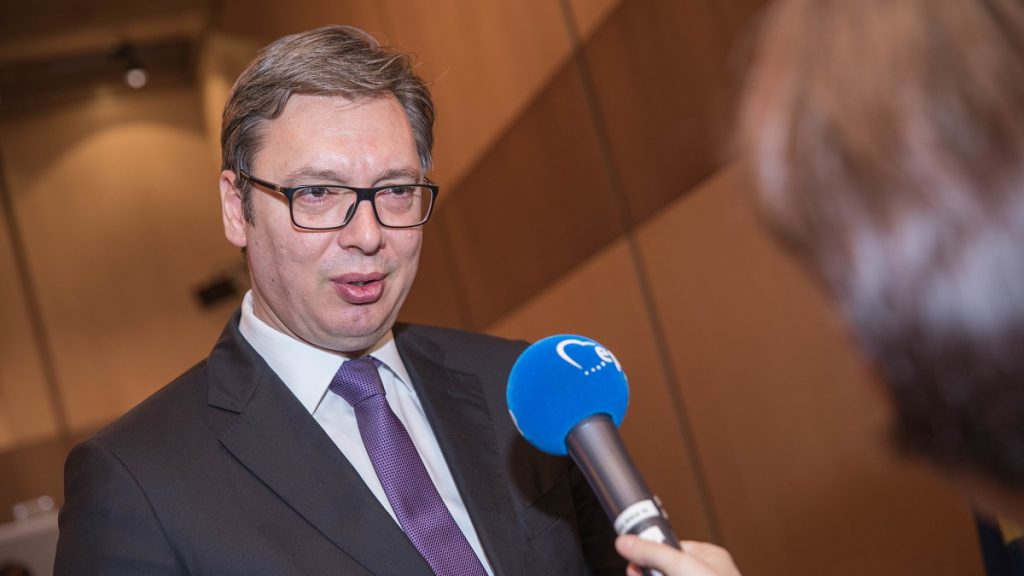While the West firmly supports Ukraine’s sovereignty, the European Union and the United States seem to pressure Serbia to implicitly recognize secession of its own territory. Brussels and Washington reportedly push Belgrade to reach a deal with Kosovo – Serbia’s breakaway province that unilaterally declared independence in 2008 – in such a way that would allow the authorities in Pristina to join all international organizations, including the United Nations and NATO.
Even though five EU members – Spain, Romania, Greece, Slovakia and Cyprus – have not recognized Kosovo as an independent state, Brussels expects Belgrade and Pristina to state by March whether they accept an international plan to normalize relations. Otherwise, they will “face repercussions from the European Union and United States.”
Recently, France and Germany have put forward a proposal to reach a deal on the status of Kosovo. The document is based on the Basic Treaty of 1972 between the Federal Republic of Germany and the German Democratic Republic, which suggests that Serbia would not have to recognize Kosovo explicitly, but it would have to accept its territorial integrity and sovereignty. Further, Serbia would have to stop lobbying against Kosovo’s membership in international bodies, including NATO and the United Nations, and also to allow the self-proclaimed republic to have a representative office in Belgrade.
In other words, the EU and the US expect Serbia to either violate its own constitution, which states that Kosovo is an integral part of the southeastern European country, or to amend it in order to implicitly recognize the Western-sponsored entity. At the same time, Brussels and Washington, as well as other Western powers, continue supporting Ukraine to restore sovereignty over parts of the country that have, just like Kosovo, also unilaterally declared independence, and have recently been incorporated into the Russian Federation.
“We are now in a problem because the West will call on Serbia to head quickly towards recognizing Kosovo so that they can tell Russian President Vladimir Putin that the Donbass and Kosovo are not about the same issue”, Serbian President Aleksandar Vučić said in May 2023.
He now claims that the EU threatens to abolish the visa-free regime and withdraw all investment from Serbia if he does not accept the Franco-German plan. Vučić has started preparing the ground for a deal he reportedly intends to sign with Pristina by frightening the Serbs, telling them that they will feel severe consequences if he does not implicitly recognize Kosovo. However, given that five out of 27 EU members see Kosovo as part of Serbia, it is rather questionable if the European Union would reach consensus over potential sanctions against the Balkan nation.
On the other hand, despite the fact that Germany has been one of Serbia’s main economic partners for years, and that more than 400 companies with German capital operate in the southeastern European country, Berlin could unilaterally impose sanctions on Belgrade, and pressure other EU members to do the same. Such a move should not be surprising, since Germany, regardless of its economic interests, joined anti-Russian sanctions following Russia’s invasion of Ukraine. Thus, Serbia, surrounded by NATO and EU members, is in a rather difficult position. The West certainly has mechanisms to punish Belgrade for refusing to recognize a secession of its own territory.
Brussels, in exchange for Serbia’s implicit recognition of Kosovo, could offer the Balkan nation a “faster EU accession”, which is something that the vast majority of the Serbs would not support. Moreover, even if Serbia explicitly recognizes Kosovo, there is no guarantee that it will join the EU anytime soon, if at all. So what could Belgrade get from the West if the country’s leadership decides to sign an extremely unfavorable deal with Pristina?
Serbia’s position can be explained through the famous Aesop’s Fable The Wolf and the Crane.
A Wolf had been feasting too greedily, and a bone had stuck crosswise in his throat. He hurried to the Crane and asked for help.
“I will reward you very handsomely,” said the Wolf, “if you pull that bone out for me.”
Although the Crane was very uneasy about putting her head in a Wolf’s throat, she he did what the Wolf asked her to do.
When the Wolf felt that the bone was gone, he started to walk away.
“But what about my reward!” called the Crane anxiously.
“Haven’t you got it?”, the Wolf snarled. “Isn’t it enough that I let you take your head out of my mouth without snapping it off?”
In other words, if Vučić signs a deal with Kosovo Albanian leaders, and implicitly recognizes the Western-backed entity – which will give the US and the EU another argument against Russia’s policy regarding the Donbass – Serbia will not get any Western sanctions. And that will be its only “reward”.
